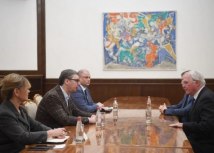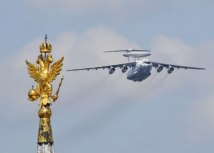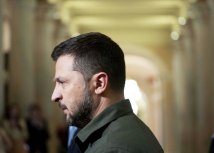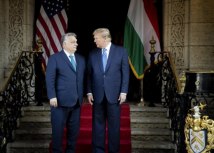Uncovering Kim Jo-Tyrant
Who comes out well from the row about a BBC reporter smuggling himself in to North Korea on a London School of Economics study tour?
Timothy Garton AshIt’s a good thing the BBC did not send its undercover reporter to North Korea with a group of students from Oxford University, otherwise Oxford’s Chancellor, Chris Patten, would have had to send a strongly worded letter of protest to the Chairman of the BBC Trust, Chris Patten. ‘I cannot understand how you could allow…’ (Yes, it is the same Chris Patten.)
I refer to the row about journalist John Sweeney travelling to North Korea with a group of London School of Economics (LSE) students, on undercover assignment for the BBC’s Panorama programme. Compared to working out if there is a real threat of nuclear war from the world’s last full-dress totalitarian state, this may seem like a storm in a British teacup. But it prompts us to reflect on how we can discover what nasty, secretive regimes are up to, without sacrificing our own values and endangering others along the way.
As someone who has spent a good chunk of his life trying to do just that, in journalism and in academia, I’ve been interested in responses on both sides of the academia-journalism fence. I start from a strong sympathy with the undercover reporter. We owe no duty of honesty to tyrants. There is nothing to compare with being there, on the spot. The first article I ever published was a report based on joining a ‘Progressive Tour’ to Albania, then suffering under a totalitarian regime with a strong resemblance to today’s North Korea. If Sweeney had embedded himself in one of the tours that travel regularly to North Korea, as other journalists have, he would deserve only praise. But he didn’t, and no-one comes out of this story very well.
The LSE had legitimate grounds for concern. It seems that a few of those on the trip had not been told about their journalistic accompaniment. The students subsequently received bullying emails from a North Korean official, threatening to publish their ‘personal data’ because they had broken North Korean law. If any of them wanted to pursue an academic career in North Korean studies, this would not be a good start. But the School’s highly public reaction was over-the-top, and arguably counter-productive.
The BBC’s expert prior assessment, which concluded that the students risked at most brief detention and expulsion, was probably about right. LSE made virtually no acknowledgement of the genuine public interest in such a journalistic investigation. Its call for the programme not to be broadcast at all was ridiculous. Its thermonuclear response must draw the attention of every authoritarian regime to the journalistic worm that might be hidden in any LSE study group. A strong private protest to the BBC would have been best.
The BBC exhibited that proclivity for weak and contorted compromise which seems to be a hallmark of its recent management. If it had got written, informed consent from everyone on the trip, as its own Editorial Guidelines suggest, then no reasonable person could have complained. ‘Students are adults, after all,’ as a former head of Oxford University’s department of politics and international relations exclaimed. Instead, most of them seem to have been partially informed, apparently in individual conversations with the reporter’s wife (an LSE alumna, who was organising the trip) and the cameraman. But even those students were not fully informed - for their own protection, BBC managers said.
This is inconsistent and silly. It’s the same muddled management style which led to only a tiny clip from the song ‘Ding Dong! The Witch is Dead’, virally promoted online as a posthumous insult to Margaret Thatcher, being played on BBC Radio One’s chart show, together with a spoken explanation of the background. For God’s sake, Auntie, make up your mind. Either play the bloody song or don’t. Either get the students’ consent, or don’t. (For the benefit of foreign readers: ‘Auntie’ is a traditional appellation for the BBC.)
As for Sweeney Agonistes, one can see why the fact that his wife was organising this trip for an LSE student society was tempting. But a whizz around the BBC website reveals a story posted just five days before the Panorama broadcast, explaining the possibilities of tourism to North Korea. One satisfied customer describes himself as an ‘adventure tourist’. An expert on Pyongyang’s nuclear programme tells me that when he spoke at a foreign correspondents’ club in London, half the journalists in the room seemed to have visited North Korea on such tours.
Moreover, the value added by the BBC programme did not match its hype. It was interesting to see what foreigners are shown – a chilly model hospital with no patients, for example – and a few blurry glimpses of what they are not shown – the miserable poor, squatting in ditches. But most of the real insights came from experts and defectors interviewed outside the country. ‘So, welcome to the real North Korea’ declared Sweeney dramatically, standing inside a barbed wire fence apparently built to keep ordinary people away from his tour group’s hotel. Cut to a long-distance camera shot of some miserable-looking apartment buildings. But he wasn’t in the real North Korea; he was in a Potemkin village inn. Back in downtown Pyongyang, he teetered over the edge into self-parody, intoning ‘something’s going on…you can feel the tension rising. The problem is: it’s impossible for us to ask what’s really happening. We don’t know’.
Contrast this with Nothing to Envy by Barbara Demick, which carefully and movingly tells the personal stories of six North Koreans, based on extensive interviews and all other available sources. Demick, a journalist with a decade’s experience in the region, makes extensive acknowledgement to fellow correspondents, academics and experts of all kinds. The result is a fantastic book, which gives us some of the truth that North Korea’s progressive tour guides are paid to hide. Moral of the story? It’s precisely in those secretive, nasty places that real knowledge only comes from years of hard work by journalists and academics alike, sharing the fruits of their complementary crafts.
timothygartonash.com
Timothy Garton Ash is Professor of European Studies at Oxford University, where he directs www.freespeechdebate.com, and a Senior Fellow at the Hoover Institution, Stanford University. He is the author, most recently, of Facts are Subversive: Political Writing from a Decade Without a Name



